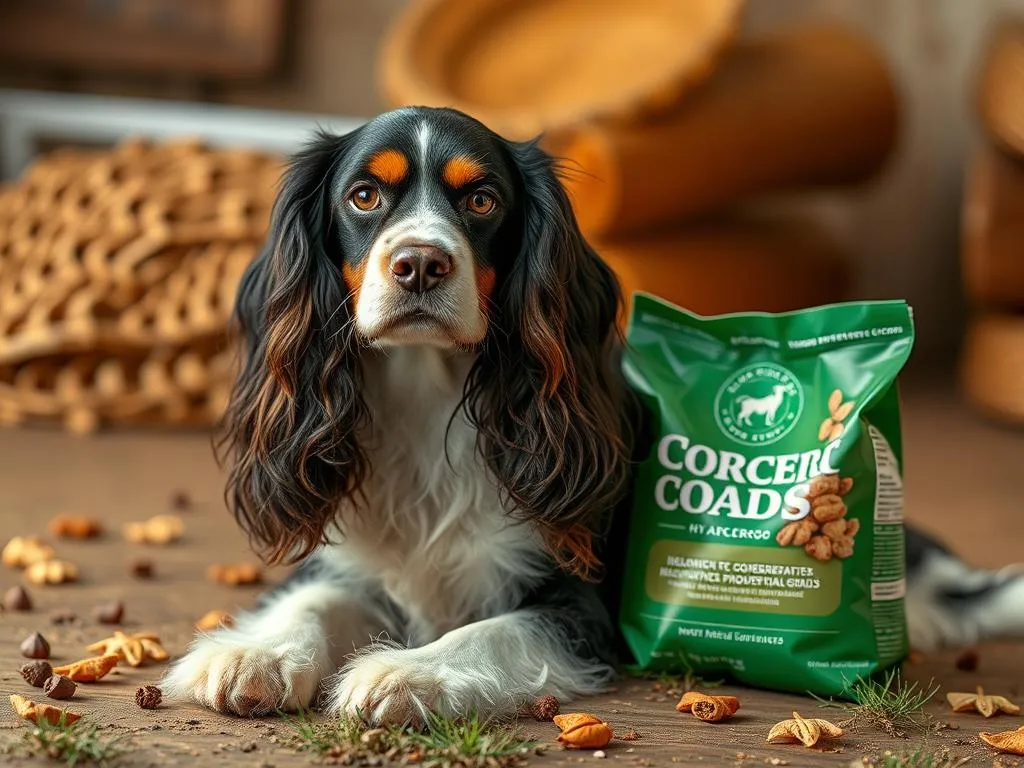
Introduction
Cocker Spaniels are beloved family pets known for their affectionate nature and playful spirit. Typically weighing between 20 to 30 pounds, these medium-sized dogs boast a friendly temperament and are often eager to please. However, like all breeds, they are prone to certain health issues, including allergies, obesity, and ear infections.
Proper nutrition plays a crucial role in maintaining their health, energy levels, and longevity. The right diet can help prevent common health issues and ensure your Cocker Spaniel thrives in every stage of life. This article serves as a comprehensive guide to selecting the best dog foods for Cocker Spaniels, tailored to their unique needs.
Understanding Cocker Spaniel Nutritional Needs
Cocker Spaniels have specific nutritional needs that vary with age, activity level, and health conditions.
Age Considerations
-
Puppies: Young Cocker Spaniels require a diet rich in protein and essential nutrients to support their rapid growth and development. Puppy formulas typically contain higher fat and protein levels to meet these needs.
-
Adults: Adult Cocker Spaniels need a balanced diet that maintains their weight and supports their energy levels. Look for foods that provide high-quality proteins and healthy fats.
-
Seniors: Older Cocker Spaniels may benefit from lower-calorie diets to prevent obesity, along with added joint support ingredients like glucosamine and chondroitin.
Activity Level
Cocker Spaniels are energetic dogs that enjoy playtime and exercise. Their dietary requirements increase with higher activity levels. Active dogs need more calories, while less active ones should have their portions adjusted to prevent weight gain.
Common Health Issues
Cocker Spaniels are susceptible to certain health conditions, including:
-
Allergies: Many Cocker Spaniels experience food allergies, which can lead to skin irritations and gastrointestinal issues. A hypoallergenic diet may be beneficial.
-
Obesity: Due to their love for food and treats, Cocker Spaniels can easily become overweight. It’s essential to monitor their calorie intake and choose weight management formulas if necessary.
-
Ear Infections: Their long ears can trap moisture, leading to infections. Ensuring a balanced diet may help support their immune system.
Key Nutritional Components
Understanding the nutritional components necessary for Cocker Spaniels is essential for selecting the best dog foods for Cocker Spaniels.
Proteins
High-quality protein sources are vital for Cocker Spaniels, as they support muscle development and overall health. Aim for dog foods that contain real meat, fish, or poultry as the first ingredient. The recommended protein levels are:
- Puppies: 22-32% protein
- Adults: 18-25% protein
- Seniors: 18-25% protein with a focus on digestibility
Fats
Fats provide energy and support skin health, making them an essential part of a Cocker Spaniel’s diet. Look for foods that include healthy fats, such as:
- Omega-3 and Omega-6 fatty acids: These are crucial for maintaining healthy skin and a shiny coat. Fish oil or flaxseed oil are great sources.
Carbohydrates
While dogs are carnivores, carbohydrates provide a source of energy and aid in digestion. Opt for whole grains and vegetables that are easy to digest. Recommended sources include:
- Brown rice
- Sweet potatoes
- Oats
Vitamins and Minerals
A balanced diet should include essential vitamins and minerals to support overall health. Key nutrients for Cocker Spaniels include:
- Vitamin A: Supports vision and immune function.
- Vitamin E: Acts as an antioxidant.
- Calcium and Phosphorus: Important for bone health.
Types of Dog Food
There are several types of dog food available, each with its own pros and cons.
Dry Dog Food (Kibble)
Dry dog food is convenient and helps keep teeth clean. However, not all kibble is created equal. When selecting kibble for your Cocker Spaniel, consider:
- Pros: Easy to store, less expensive, good for dental health.
- Cons: Some formulations can be low in meat content.
Recommended Brands:
– Orijen Original Dry Dog Food: High in protein and made from fresh, regional ingredients.
– Wellness CORE Grain-Free: Offers a balanced diet with high-quality protein.
Wet Dog Food (Canned)
Wet dog food can be more palatable for picky eaters and provides additional moisture in the diet.
- Pros: More flavorful, good for hydration.
- Cons: Can be more expensive and may contain preservatives.
Suggested Options:
– Hill’s Science Diet Adult Canned Dog Food: Formulated for optimal health, with a focus on digestible ingredients.
– Blue Buffalo Homestyle Recipe: Made with real meat and wholesome ingredients.
Raw Diet
A raw diet mimics what dogs would eat in the wild, consisting of raw meat, bones, and organs.
- Pros: Can provide a healthier coat and improved digestion.
- Cons: Requires careful planning and may pose a risk of bacterial contamination.
Homemade Dog Food
Preparing homemade dog food offers complete control over ingredients, but it requires careful planning to ensure it’s nutritionally balanced.
- Pros: Tailored to your dog’s needs.
- Cons: Time-consuming and may lack essential nutrients if not done correctly.
Key Ingredients to Include:
– Lean meats (chicken, turkey, beef)
– Vegetables (carrots, peas)
– Healthy grains (brown rice, quinoa)
Top Recommended Dog Foods for Cocker Spaniels
Choosing the best dog foods for Cocker Spaniels involves evaluating several factors like ingredient quality and brand reputation.
Best Dry Dog Foods
- Orijen Original Dry Dog Food
-
Highlights: High protein content, made from fresh ingredients, grain-free.
-
Wellness CORE Grain-Free
-
Highlights: Rich in meat, supports healthy digestion, grain-free.
-
Merrick Grain-Free Texas Beef & Sweet Potato
- Highlights: High protein, made with real beef, rich in Omega fatty acids.
Best Wet Dog Foods
- Hill’s Science Diet Adult Canned Dog Food
- Pros: Vet-recommended, made with high-quality ingredients.
-
Cons: Higher price point.
-
Blue Buffalo Homestyle Recipe
- Pros: Natural ingredients, great taste.
- Cons: Can be rich for some dogs.
Best Raw and Homemade Options
-
Raw Diet: Brands like Instinct Raw Boost Mixers provide a safe option for those interested in raw feeding.
-
Homemade Recipe Suggestion:
- Ingredients: Ground turkey, brown rice, carrots, peas, and spinach.
- Preparation: Cook the turkey in a pan, add cooked rice and vegetables, and mix well.
Feeding Guidelines
Understanding how to feed your Cocker Spaniel correctly is crucial for their health.
Portion Control
Portion sizes should be based on your dog’s age, weight, and activity level. Use the feeding guidelines on dog food packaging as a baseline but adjust based on your dog’s specific needs.
Feeding Frequency
- Puppies: 3-4 meals per day until six months.
- Adults: 2 meals per day.
- Seniors: Adjust based on their health needs, often transitioning to smaller, more frequent meals.
Transitioning to New Food
When switching dog foods, do it gradually over a week to avoid digestive upset. Start by mixing a small amount of the new food with the old, gradually increasing the new food’s proportion.
Common Feeding Mistakes
Avoid these common pitfalls to ensure your Cocker Spaniel remains healthy and happy.
Overfeeding and Obesity
One of the most common mistakes is overfeeding, which can lead to obesity. Monitor your dog’s weight and adjust food portions accordingly.
Ignoring Nutritional Labels
Always read the nutritional labels. Look for high-quality ingredients and avoid foods with fillers like corn and soy, which can contribute little to your dog’s diet.
Inconsistent Diet
Frequent changes in diet can cause digestive issues. Stick to a consistent food brand and type, only changing when necessary.
Conclusion
Choosing the right food for your Cocker Spaniel is essential for their health and well-being. By understanding their unique nutritional needs, selecting high-quality ingredients, and monitoring their feeding habits, you can ensure your furry friend leads a happy, healthy life. Remember, consulting with a veterinarian can provide tailored recommendations to meet your Cocker Spaniel’s specific dietary requirements.









